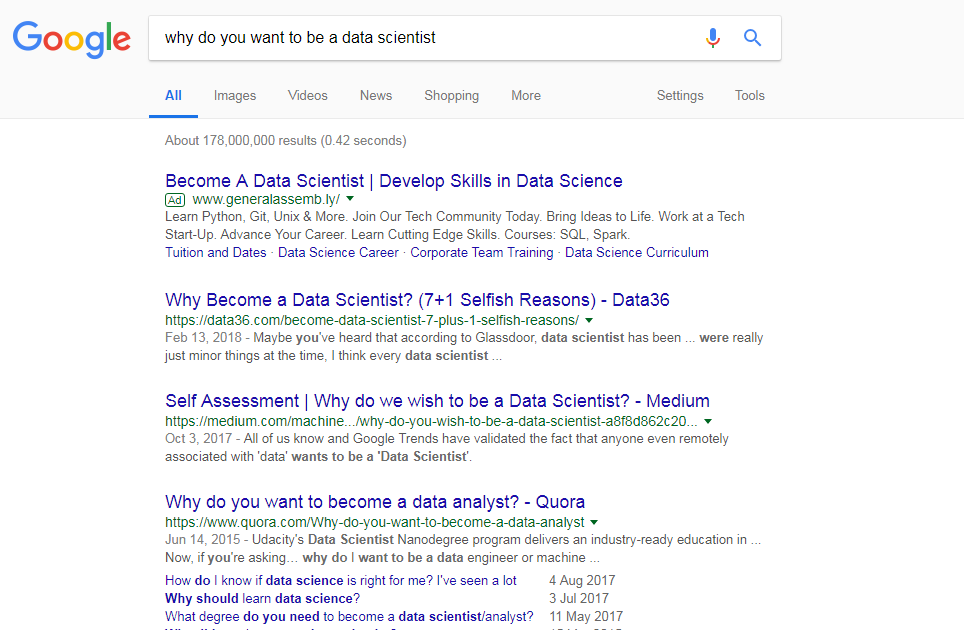Information equity in online search results
- datadoubleconfirm

- Aug 5, 2018
- 4 min read
In this age of digitalisation, most of us do our research/ obtain information online. And whether we are conscious or not, it is hard to deny that we are sometimes nudged by advertisements. It is also highly likely that we will click on whatever that appears at the top of the search results. Hence companies will pay to get their ads appear at the top, with search engines helping in the "appropriate" targeting so as to reap the highest returns.
With data mining on user preferences and socio-demographics, recommendations become more and more personalized, what you see could be very different from what I see. To illustrate, I compare the ad search results for same/ different individuals using same/ different device, operating system, browser, changing only one variable at one time and keeping the rest consistent. The searches are all accessed from Singapore.
Summary of Search results for "how to become a data scientist" by device, operating system, browser, user age, date:
Laptop. Windows. Chrome. 28-year-old. Accessed 30 Jul 2018. // 4 ads (general assembly, datacamp, udemy, MIT).
Laptop. Windows. Chrome. 27-year-old. Accessed 30 July 2018. // No ad.
Laptop. Windows. Chrome. 20-year-old. Accessed 30 July 2018. // 3 ads (general assembly, udemy, datacamp).
Laptop. Windows. IE. 28-year-old. Accessed 30 July 2018. // At least 8 ads.
Laptop. Mac. Chrome. 31-year-old. Accessed 31 July 2018. // 4 ads (datacamp, udemy, general assembly, smartnation scholarship).
iPad. Chrome. 20-year-old. Accessed 31 July 2018. // 4 ads (general assembly, datacamp, linkedin, smartnation scholarship).
iPad. Safari. 20-year-old. Accessed 31 July 2018. // 2 ads (general assembly, datacamp).
iPad. Firefox. 20-year-old. Accessed 31 July 2018. // 4 ads (general assembly, smartnation scholarship, datacamp, linkedin).
Summary of Search results for "why do you want to be a data scientist" by device, operating system, browser, user age, date:
Laptop. Windows. Chrome. 28-year-old. Accessed 30 July 2018. // No ad.
Laptop. Windows. Chrome. 27-year-old. Accessed 30 July 2018. // No ad.
Laptop. Windows. Chrome. 20-year-old. Accessed 30 July 2018. // 1 ad (general assembly).
Laptop. Windows. IE. 28-year-old. Accessed 30 July 2018. // No ad.
Laptop. Mac. Chrome. 31-year-old. Accessed 31 Jul 2018. // No ad.
iPad. Chrome. 20-year-old. Accessed 31 July 2018. // 1 ad (general assembly).
iPad. Safari. 20-year-old. Accessed 31 July 2018. // 1 ad (general assembly).
iPad. Firefox. 20-year-old. Accessed 31 July 2018. // 2 ads (general assembly, ibm).
See below for exact screenshots of the search results.
While personalization brings bout relevancy (privacy-issue aside), will one be missing out certain opportunities due to such personalization? Will our browsing habits determine the open/ closed doors and is there anything we can do about this? If we look at the search results using IE (see screenshots below), it is obvious that they are very different from what is shown from using Google. As reported in this 2012 TIME article, according to the Wall Street Journal, travel website Orbitz.com has begun showing more expensive hotel offers to people accessing the site from Macintosh computers — a group of customers that spend as much as 30% more on their hotel rooms, according to the company’s research. On the other hand, this is similar for mobile. A research shows that on average, Android users spend $11.54 per transaction while iPhone users spend a whopping $32.94 per transaction, i.e. iPhone users will spend almost three times as much as Android users when visiting an e-commerce site.
Information equity, which refers to fair opportunity for everyone to access information regardless of demographic, social, economic or geographic strata, will become an increasing concern if the differences become more and more stark (definition for equity referenced from WHO site). Greater information sharing among people from diverse backgrounds is hence more important than ever and that diversity should be embraced.
This piece of writing is inspired by ProPublica's work on How Political Advertisers Target you on Facebook.
Search results for "how to become a data scientist"
Laptop. Windows. Chrome. 28-year-old. Accessed 30 Jul 2018. // 4 ads (general assembly, datacamp, udemy, MIT).

Laptop. Windows. Chrome. 27-year-old. Accessed 30 July 2018. // No ad.

Laptop. Windows. Chrome. 20-year-old. Accessed 30 July 2018. // 3 ads (general assembly, udemy, datacamp).

Laptop. Windows. IE. 28-year-old. Accessed 30 July 2018. // At least 8 ads.

Laptop. Mac. Chrome. 31-year-old. Accessed 31 July 2018. // 4 ads (datacamp, udemy, general assembly, smartnation scholarship).

iPad. Chrome. 20-year-old. Accessed 31 July 2018. // 4 ads (general assembly, datacamp, linkedin, smartnation scholarship).

iPad. Safari. 20-year-old. Accessed 31 July 2018. // 2 ads (general assembly, datacamp).

iPad. Firefox. 20-year-old. Accessed 31 July 2018. // 4 ads (general assembly, smartnation scholarship, datacamp, linkedin).

Search results for "why do you want to be a data scientist"
Laptop. Windows. Chrome. 28-year-old. Accessed 30 July 2018. // No ad.

Laptop. Windows. Chrome. 27-year-old. Accessed 30 July 2018. // No ad.

Laptop. Windows. Chrome. 20-year-old. Accessed 30 July 2018. // 1 ad (general assembly).

Laptop. Windows. IE. 28-year-old. Accessed 30 July 2018. // No ad.

Laptop. Mac. Chrome. 31-year-old. Accessed 31 Jul 2018. // No ad.

iPad. Chrome. 20-year-old. Accessed 31 July 2018. // 1 ad (general assembly).

iPad. Safari. 20-year-old. Accessed 31 July 2018. // 1 ad (general assembly).

iPad. Firefox. 20-year-old. Accessed 31 July 2018. // 2 ads (general assembly, ibm).


Comments